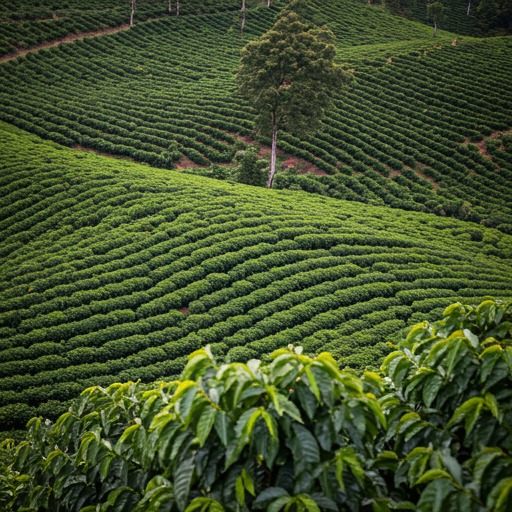Investing in farmland has long been a sound financial decision, providing returns that often surpass those of traditional assets like stocks and bonds. As investors increasingly look for options that not only promise growth but also align with their environmental values, managed farmland stands out as an eco-friendly investment path. For those who are both profit-minded and eco-conscious, managed farmland offers a unique opportunity to achieve stable financial returns while contributing to the health of the planet. This guide delves into what it means to invest in sustainable, managed farmland, focusing on the benefits, how to choose the right land, and how we have pioneered a model of farmland investment that intertwines profitability with environmental stewardship.
Managed farmland is a term for plots of land that are professionally maintained and cultivated by experts on behalf of investors or owners. Unlike traditional farmland ownership, where the owner might be directly involved in day-to-day operations, managed farmland offers a more hands-off experience. This approach means investors can own a slice of nature without needing the agricultural expertise or time to personally manage it. Instead, they benefit from a team of experienced professionals who ensure the land is farmed sustainably, with soil health, water conservation, and crop diversity in mind.
The appeal of this model lies in its dual focus on providing financial gains and supporting eco-friendly practices. Traditional agriculture, while a pillar of global food production, often has a significant ecological footprint. Managed farmland that is eco-conscious seeks to counter these impacts by prioritising practices like organic farming, crop rotation, tree planting, and renewable energy use, all of which reduce carbon emissions and promote biodiversity. For investors looking to reduce their environmental impact, investing in such land becomes not only a financial decision but also a meaningful contribution to sustainability.

The appeal of this model lies in its dual focus on providing financial gains and supporting eco-friendly practices. Traditional agriculture, while a pillar of global food production, often has a significant ecological footprint. Managed farmland that is eco-conscious seeks to counter these impacts by prioritising practices like organic farming, crop rotation, tree planting, and renewable energy use, all of which reduce carbon emissions and promote biodiversity. For investors looking to reduce their environmental impact, investing in such land becomes not only a financial decision but also a meaningful contribution to sustainability.
One of the primary eco-benefits of managed farmland is soil regeneration. Healthy soil is a powerful carbon sink, absorbing carbon dioxide from the atmosphere and storing it in the earth. By using organic farming methods and avoiding harsh chemical fertilisers and pesticides, managed farmland reduces harmful runoff that typically contaminates nearby water sources. Instead, organic practices support soil health, ensuring that the land remains fertile and rich in nutrients for future generations.
Biodiversity is another critical aspect. Through thoughtful crop selection and rotation, Our projects help maintain and even enhance local ecosystems. For example, the sandalwood and pepper plantations at our Ecopia project in Coorg add to the region’s natural flora without disturbing the local balance. These plantations also create micro-habitats that support bird species, insects, and other wildlife, preserving the biodiversity that is often lost in conventional monoculture farming.
Reforestation is also integrated into Utopiaa’s projects, particularly in regions like Coorg and Madikeri, where natural forests support a rich variety of life. Through selective planting of trees, including species native to the area, We contribute to carbon sequestration while restoring habitats for native wildlife. This holistic approach ensures that managed farmland doesn’t just extract resources but gives back to the environment, creating a balanced ecosystem that benefits both investors and nature.
Selecting the right piece of managed farmland for investment involves evaluating both the land’s potential returns and its environmental impact. Here are some factors to consider:
Utopiaa is not just a managed farmland company—it’s a vision for eco-friendly, sustainable agricultural living. Our diverse portfolio of farmland projects across Karnataka showcases the perfect blend of economic gain and environmental responsibility. Here’s a closer look at some of our projects and what makes each unique:

Investing in managed farmland with a company like Utopiaa allows investors to enjoy the financial benefits of sustainable agriculture without the logistical burden of managing the land themselves. Utopiaa’s approach ensures that each piece of land we manage not only yields high-value crops but also contributes to environmental health. Our projects focus on low-impact farming, efficient resource usage, and biodiversity, supporting long-term land value appreciation and consistent crop yields. This model provides our investors with an ideal balance of financial security and peace of mind, knowing that their investments are actively contributing to a healthier planet.
Eco-conscious investing is more than just a trend—it’s a movement that’s reshaping how people think about financial growth. For investors looking for sustainable, profitable options, managed farmland represents a compelling asset class. It offers all the benefits of traditional farmland investment, like inflation resistance and long-term growth, while emphasising sustainability, biodiversity, and responsible land management.
We are at the forefront of this movement. By providing managed farmland that aligns with modern values, we empower investors to achieve not only financial returns but also make a lasting positive impact on the environment. Whether you’re interested in a serene retreat in Coorg, a villa near Nandi Hills, or farmland near Bangalore, Utopiaa has a range of eco-friendly projects to suit diverse investment goals. For eco-conscious investors, managed farmland with Utopiaa is more than an investment—it’s a commitment to sustainable living, environmental stewardship, and financial resilience.
As you consider your next investment, think beyond traditional assets. Investing in managed farmland is a step towards a greener, more sustainable future—one that yields both personal and planetary rewards.
If you’re an eco-conscious investor looking to make a meaningful impact while enjoying stable, long-term financial returns, Utopiaa managed farmlands are your gateway to sustainable growth. Our projects offer a unique blend of profitability, environmental stewardship, and lifestyle enrichment. Join us in transforming agricultural investment into a force for good—one that nurtures both nature and your portfolio.
Visit Utopiaa today to explore our projects, or get in touch to learn more about how you can invest in the future of eco-friendly, managed farmland. Together, let’s cultivate a greener tomorrow